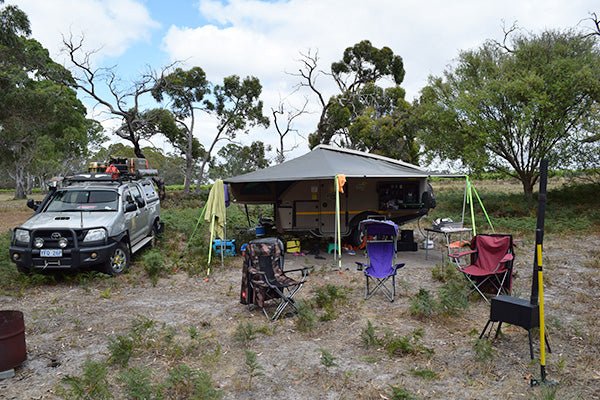
Do you call yourself a camper trailer enthusiast?
|
|
Time to read 3 min
|
|
Time to read 3 min
It’s a fair bet that those of us who routinely read CTA are proud owners (or aspiring owners) of a camper trailer. Some seek inspiration for our next purchase and others pick up lifestyle tips and on-the-road advice. Whatever we’re looking for, we probably all consider ourselves proud members of the camper trailer community. After all, there are plenty of myths that caravans are for older, less adventurous people – even though the majority of caravan owners are within the 39-49 age bracket. By associating ourselves with camper trailers, perhaps many of us think we take a more rugged and daring approach than our caravanning colleagues, and have a closer affinity with the natural environment.
But are we kidding ourselves? These days the market offers such diversity within the camper trailer category that it’s becoming difficult to distinguish where camper trailers stop – and caravans start.
The Macquarie Dictionary defines ‘camper trailer’ as “a self-contained, tent-like shelter with a lift-up solid roof and canvas walls, which folds into a smaller trailer.” These setups are sometimes referred to as ‘swing-out camper trailers’ or ‘tent trailers’.
This style of camper trailer has an impressive pedigree. You may be surprised to know that commercially-produced tent trailers originated in the early 1900s, emerging with the growing popularity of the motor vehicle industry. The earliest known patent for a camper trailer dates to 1916 in the US, the same time that mass production commenced (visit www.popupcamperhistory.com). On this basis, ‘real’ camper trailer owners are people who have an ongoing relationship with zips, flymesh, pegs and lots (and lots) of canvas.
But where does that leave the rest of us? Wind-up trailers (epitomised by Jayco) and hybrid campers (like the Echo 4x4 Kavango) are well-entrenched in the market and they’re routinely embraced in CTA reviews and features. Many of us come to these styles of rigs because we want a tenting experience, without battling 50+sqm of canvas every time we hit the sack, particularly after long-haul travel. If our rigs claim their place in the camper-trailer ‘club’, where does it stop?
Seeking an answer, I found that the Commonwealth Department of Infrastructure and Regional Development had a crack at drawing a line. What I find is that I’m likely to be looking at a caravan if the rig has “fixed sleeping accommodation and/or facilities for the preparation of food”.
Otherwise, it’s probably a camper trailer. So, on this reckoning, a 12ft hard-sided trailer with a full kitchen, dinette and on-road suspension still amounts to a ‘camper trailer’ provided it has expanding sleeping bays. And I don’t think these sleeping bays even have to be made of canvas. Rigid-sided push-out options will probably fit within the scope.
I guess – if true – this surprises me. I’d probably have categorised these luxurious setups as ‘homes on wheels’ or ‘houses in miniature’ rather than camper trailers. Offering the combination of domesticity and mobility in one package, their scaled-down kitchens, cupboards, stoves, basins, tables and beds don’t satisfy my urge for nature-based recreation and time-out from regular life. To me they look like caravans, and they probably always will.
But who am I to judge? Enjoying the great outdoors isn’t something any of us need to compete on or to adopt an exclusive attitude. Anyone who purchases a camper trailer needs to weigh their personal circumstances and assess what comforts they’re prepared to compromise. We’re positioning ourselves to enjoy this country, beyond the confines of surburbia and day-to-day routine. And that’s a good thing – regardless of what we feel we need to hitch to our tow-ball to achieve it.
Perhaps the real strength in the camper trailer fraternity is not the size and shape of our rigs, but the attitude we adopt when we hit the road. I’d like to think what binds us is a collective enthusiasm and curiosity about the great outdoors, a willingness to approach our travel with an open mind and a readiness to learn new stuff – like playing the ukelele.
In pursuit of this objective – and to quote a popular song – “we’re all in this together”.